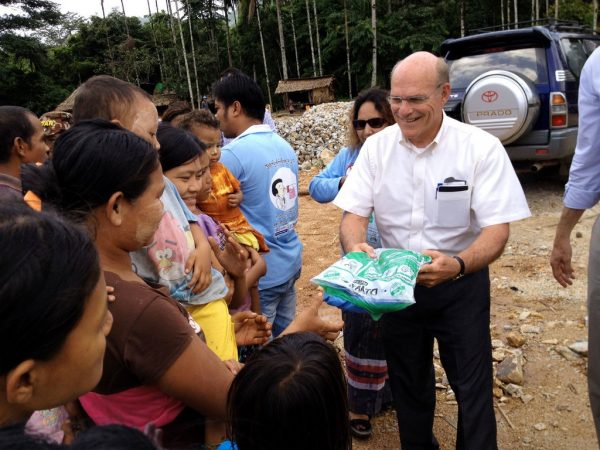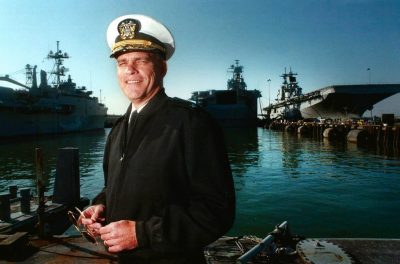BA WA PIN, Myanmar — After a knee-to-knee chat with this hamlet’s chief in the local malaria clinic as rain hammered the tin roof, Rear Adm. R. Timothy Ziemer reached into his pocket for his usual thank-you gift.
The clinic was well run, and there was a big turnout of mothers grateful for the free mosquito nets.
Accepting the thick gold-colored coin with President Obama’s face on it, the chief looked as thrilled as if he had won the Presidential Medal of Freedom.
“They’re not official,” Admiral Ziemer confessed later in an interview. “I buy them in a souvenir shop in the Reagan office building for $4.50 each.”
The moment illustrates how this 67-year-old retired Navy flier who is the coordinator of the President’s Malaria Initiative gets things done: on the ground, with little cash and less fanfare, in faraway African and Asian villages.
Although he does nothing to court publicity in status-obsessed Washington, many malaria fighters call him one of the most quietly effective leaders in public health.
“All the organizations fighting malaria work more closely than they did eight years ago,” said Ray Chambers, the private equity investor and co-founder of Malaria No More who is now the United Nations Secretary General’s Special Envoy for Malaria. “I think that’s due in no small part to Tim and his personality. He’s not seeking individual credit and he works for the team — but his trains run on time.”
Since he took the job in 2006, worldwide malaria deaths have dropped 40 percent, to about 600,000 a year from one million.
“He never seeks the limelight, but he deserves a lot of credit for that,” said Mikkel Vestergaard Frandsen, owner of Vestergaard, the world’s biggest mosquito net maker.
Many countries now use the tactics Admiral Ziemer adopted after demanding proof that they worked. For prevention, they include free distribution of nets impregnated with insecticide, indoor pesticide spraying and routine doses of malaria medicine for pregnant women. For diagnosis and treatment, they include rapid blood tests and pills that combine a new fast-acting Chinese drug, artemisinin, with one of several longer-lasting drugs.
He was touring rural Myanmar because the region is the cradle of drug-resistant malaria and his agency is fighting it by subsidizing two-drug pills. If artemisinin becomes ineffective, malaria experts say, it would be a disaster equivalent to losing chloroquine, a former “miracle cure.”
A Resilient Leader
Admiral Ziemer’s self-effacing, penny-pinching approach — he flies coach everywhere, even when executives of other relief organizations traveling with him buy business-class tickets, an aide said privately — has helped make him a political survivor.
Since he was appointed by President George W. Bush, he has outlasted three global AIDS czars.
He first drafted a resignation letter after Mr. Obama was elected; it was declined. He prepared it again after the transition team for Hillary Rodham Clinton, the new secretary of state, ousted his counterpart overseeing AIDS, Dr. Mark R. Dybul. But he was asked to stay.
He may attract less fire, he conceded, because his disease is less controversial. It does not involve condoms, abstinence, homophobia or prostitution, and no one lobbies for mosquito rights.
On a four-day visit to the country this summer, he did pay official calls on the health minister and two national laboratories.
But he also flew and drove for hours to chat with village chiefs, local malaria educators, rural doctors and pharmacists, rubber tappers and road builders.
“The people who just go to meetings in hotels aren’t the ones who matter,” he said. “They enjoy each other’s shrimp, then go home and forget everything.”
Some of his travel was through mountains off limits until two years ago because of fighting between local tribes and the army. In Ba Wa Pin, he gave out another coin: to a malaria volunteer from the embattled Karen tribe who had hiked for two days to meet him and who previously would not have dared come.
At each stop, he grills people for details: Is malaria down? How it that measured? How is the money accounted for? What obstacles remain?
In Zambia, he said, he shut down a $200,000 program “when I asked where our money was going and I got the ‘stunned owl’ look.” The admiral — who goes by Tim, or just “Z” to old Navy pals — does a good stunned-owl imitation.
He is unfailingly polite, thanking volunteers, waiters and drivers as consistently as he does government ministers. He is so low-key that many experts who praise him, including even some who have traveled with him, know almost nothing about his past — not even that he slept under mosquito nets as a child and survived a bout of malaria.
Motivated to Serve
As his convoy of State Department vehicles navigates dirt roads in the lush mountains around Ba Wa Pin, he nods down one steep river valley and says, “This looks just like where I grew up.”
From infancy through high school, he lived in Ban Me Thuot, in the central highlands of French Indochina, in what is now Vietnam. The son of missionaries with the Christian and Missionary Alliance, he spoke Rade, the local mountain tribe’s dialect, ate coconut “lakewater Popsicles,” chased French convoys begging the soldiers to throw chocolate and played in tunnels dug by the Japanese during World War II.
It was the kind of small town where the mail was delivered by a postman wearing a loincloth and riding an elephant, said Connie Fairchild, a vice president of World Relief, an evangelical charity group, who grew up next door in another missionary family. She recalled stringing tin-can telephones between their houses so they could chat — and how their fathers built a compound for people with leprosy together.
“Tim would often go there with his dad,” she said. “I think seeing people ostracized like that made a big impact in his life.”
Later, when the French pulled out, a small American military base was built nearby. “Tim went over and talked with the soldiers a lot,” she said.
“In school, he was just a natural leader,” she added, recalling times he taught classmates to walk on stilts and organized jump-rope sessions for 100. “He was good-looking, athletic, smart and kind. All the girls liked him. But he was devoted to Jodi,” she added, referring to Jodi Evans, the daughter of missionaries working in Pleiku, a nearby town. The two were later married, and still are.
In 1964, he left for Wheaton, a religious college near Chicago. Four years later, during the Tet offensive, North Vietnamese and Vietcong soldiers overran Ban Me Thuot. Local families fled to the mission clinic, which then came under attack.
His father was killed while trying to negotiate evacuation of the wounded. Grenades were thrown into the missionaries’ bunker. Only his mother survived — bleeding from 18 wounds.
When the North Vietnamese retreated during a counterattack, they left her in a ditch. A local man rescued her and contacted the Americans. She was evacuated to Andrews Air Force Base in Maryland, in a plane full of wounded G.I.s.
When her 21-year-old son climbed aboard, she handed him verses she had copied from a hymn about counting one’s blessings, and naming hers — her years with her husband, her three children, her life serving the Vietnamese, her medical care and knowing Jesus.
In his senior year, facing the draft, he joined the Navy and asked to return to Vietnam.
He became a helicopter pilot — one straight out of “Apocalypse Now.” He flew 550 missions with the Sea Wolves, a unit based in the Mekong Delta, extracting Navy SEALs from missions and protecting the river patrol boats like those that Secretary of State John Kerry served on.
He was not avenging his father, he insisted in an interview.
“I was taught that vengeance was the Lord’s and you defer to that,” he said. “After a strike, I was pleased that I could say ‘mission accomplished,’ but I never felt, ‘Ah, I got somebody back.’ In fact, if I had a junior officer I knew was out for revenge, I’d probably keep him out of the air.”
Being a missionary’s son gave him a need to serve, he said. Also, he saw the fight as a civil war in which the South Vietnamese, among whom he had grown up, needed help against the North.
After Vietnam, he spent years as a squadron leader, hunting Soviet submarines and teaching, before being promoted into the Pentagon. After retirement, he headed World Relief.
A Different Approach
The malaria initiative was founded in 2005, backed in Congress by liberal proponents of foreign aid and conservatives with ties to evangelical churches with missionary hospitals like the one run by Admiral Ziemer’s father.
At the time, the government’s anti-malaria efforts were in a shambles. They were backing outdated drugs, and most of the budget went to consultants designing ad campaigns telling Africans to buy mosquito nets — which most could not afford.
Congress authorized $1.2 billion for the first five years, specifying that the bulk of it be spent on goods to be given away free or at subsidized prices — not on consultants.
The initiative now supports efforts by 25 countries in Africa and Southeast Asia.
“My motivation is to keep it moving — and to look out for the kids I brought onto the team,” he said.
So he keeps traveling to places like Ba Wa Pin.
“All my ex-flag-officer colleagues work for Beltway bandits,” he said, describing former admirals working for defense contractors. “They play a lot of golf, go up and down the Chesapeake in their boats. At reunions, they’ll give me grief. ‘Hey, Z, you still saving the world?’ And I’ll say, ‘Yep, still saving the world.’ ”
Correction:
An article on Tuesday about Rear Adm. R. Timothy Ziemer and the global fight against malaria misstated his age when he boarded the plane that had evacuated his wounded mother from Vietnam. He was 21 at the time, not 17. The article also referred incorrectly to his parents’ missionary work. They were missionaries with the Christian and Missionary Alliance; they were not Presbyterian missionaries.


